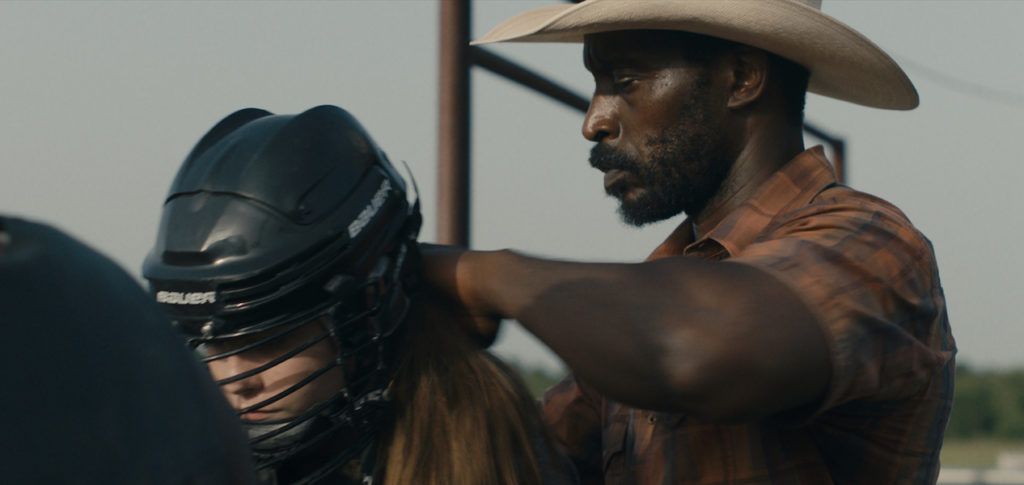Capsule reviews for May 1

Amber Havard and Rob Morgan star in BULL. (Photo: Samuel Goldwyn Films)
Bull
Gritty authenticity among both the hard-luck characters and the rural Texas milieu drive this drama of redemption when two small-town strangers converge. Kris (Amber Havard) is a rebellious teenager from a troubled family who breaks into and stages a party at the home of struggling rodeo clown Abe (Rob Morgan). As she performs chores for restitution, Kris becomes intrigued by bull riding and learns more about Abe’s hardscrabble history. As she probes their reluctant partnership, rookie director Annie Silverstein sidesteps clichés with a character-driven saga of life on the socioeconomic margins, magnified by the dangers of the sport in which both of them seek solace. (Not rated, 108 minutes).
Capital in the Twenty-First Century
Rarely has a high-level economics lecture felt as urgent or compelling as in this persuasive documentary about the potentially damaging trends of global capitalism, based on Thomas Piketty’s book. It explores the link between accumulation of wealth, power and influence, and social progress through the past few centuries, and ties that into contemporary socioeconomic troubles involving worldwide income inequality. It’s meant to spur both anger and action, although its sheer scope, and the expertise of its interviewees, makes it difficult to dismiss as a mere anti-capitalist screed. Kiwi filmmaker Justin Pemberton assembles the material into a smart and sophisticated package that’s insightful rather than condescending. (Not rated, 103 minutes).
Deerskin
Clothes indeed make the man in the latest exercise in absurdist dark comedy from French provocateur Quentin Dupieux (Wrong), which follows an amateur filmmaker (Jean Dujardin) as he retreats to a mountain village after separating from his wife. While there, he becomes obsessed with his purchase of an Italian deerskin jacket, which empowers him with a sense of superiority and leads to a downward spiral of erratic and desperate behavior. Dupieux’s films are an acquired taste, and this likewise indulges in abundant quirks and oddities. But it’s bolstered by a committed performance from Dujardin (The Artist), who finds sympathy in a strange and tragic figure. (Not rated, 77 minutes).
The Flood
People, not water, comprise the titular surge in this earnest but compassionate drama about the European refugee crisis. It centers on a former Eritrean soldier (Ivanno Jeremiah) who fled violence in his homeland for a chance at asylum in England, if only he can convince a London immigration officer (Lena Headey) of his legitimacy. Flashbacks intimately recount his harrowing journey from Africa by land, sea, and truck. By detailing all of the bureaucratic red tape in the process, the film clarifies its sociopolitical stance. Yet while the story stretches credibility in the final act, it emerges as a provocative, heartfelt and timely plea for acceptance. (Not rated, 99 minutes).
The Sound of the Wind
It might have worked as a short subject, but at feature length, this melancholy low-budget thriller about mental illness is muddled and tedious. Almost every frame is focused on Lucio (Christian Gnecco Quintero), who is suffering from paranoid delusions that cause him to flee his family during a simple errand. Carrying a bag of money and a host of personal troubles, his erratic behavior threatens everything around him. The script bogs down in frustrating repetition and narrative detours, compromising much of the suspense. And despite a well-intentioned effort to explore Lucio’s affliction, he garners more pity than sympathy. The film itself is easier to diagnose. (Not rated, 84 minutes).
Tammy’s Always Dying
Take away the scandalous headlines, and Felicity Huffman proves her acting versatility with an audacious portrayal that outshines this otherwise muddled Canadian domestic drama. She plays the title role, an emotionally unstable mother with suicidal tendencies along with drug and alcohol addictions. Her adult daughter (Anastasia Phillips) is a part-time bartender who essentially becomes her caretaker in a toxic relationship that seems beyond repair. As details are gradually revealed about their life on the socioeconomic margins, mustering empathy for them is challenging. Even with Tammy eventually seeking redemption through a series of heavy-handed contrivances, she’s a fascinating character in need of a better movie. (Not rated, 85 minutes).